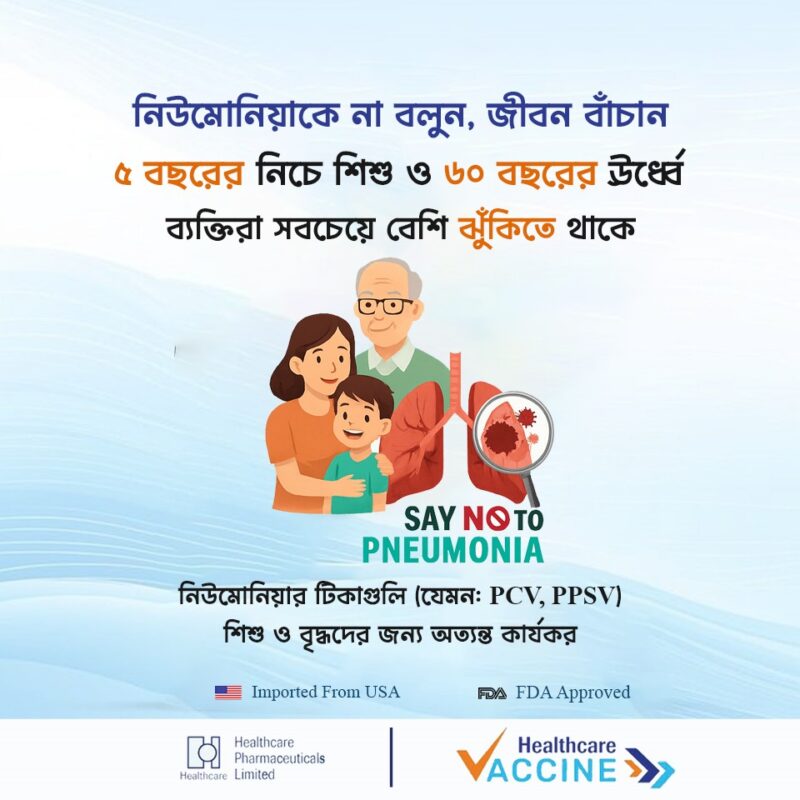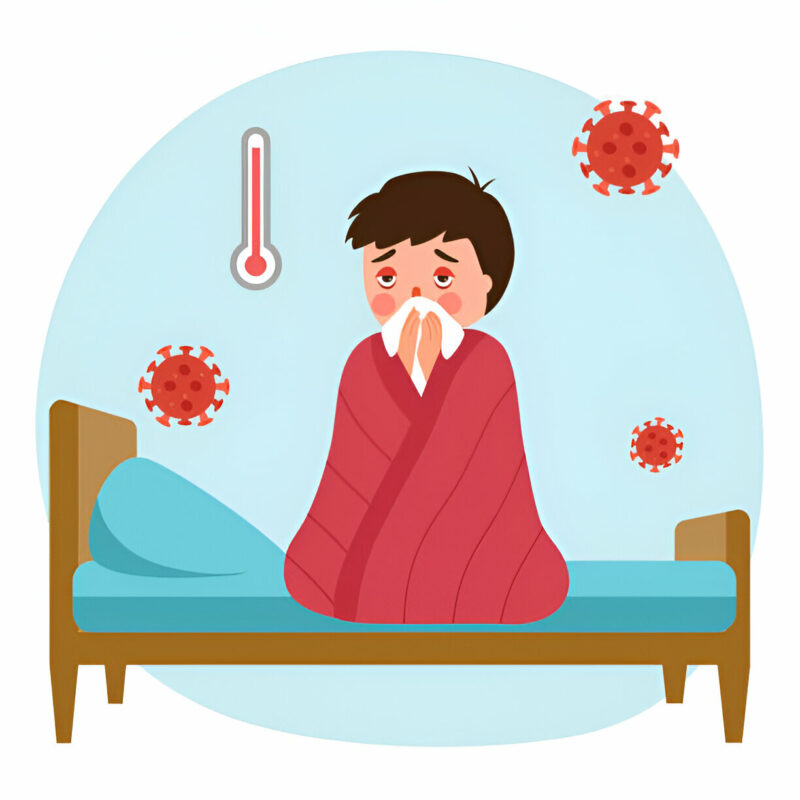Pneumonia’s Burden on Children and Families
Pneumonia is one of the deadliest infectious diseases for children under five in Bangladesh. It claims thousands of young lives each year—often in silence. Before vaccines became widespread, pneumonia was responsible for approximately 13% of under-five deaths in the country, translating to more than 12,000 preventable fatalities annually.
Why Vaccination Is Critical
The pneumococcal bacteria (Streptococcus pneumoniae) is a leading cause of severe pneumonia. Vaccination offers powerful protection—not only preventing illness but also reducing hospitalizations and saving countless lives. It is one of the most cost-effective public health tools available.
The Introduction of the Pneumococcal Vaccine
Launch of PCV10 Under the EPI Program: Bangladesh took a significant step forward by introducing the 10-valent pneumococcal conjugate vaccine (PCV10) into its Expanded Program on Immunization (EPI) in March 2015. This rollout was part of a coordinated effort alongside the inactivated polio vaccine (IPV), showcasing the government’s commitment to improving child health.
Routine Immunization Schedule for Infants: The vaccine is administered in three doses at 6, 10, and 14 weeks of age, integrated seamlessly with the pentavalent vaccine schedule. This strategic approach has led to high compliance and efficient delivery using existing health infrastructure.
Measuring Progress and Coverage
Impressive Uptake Rates and Daily Dose Volumes: As of 2025, more than 48 million children have received PCV10 in Bangladesh, with an estimated 26,000 doses administered daily. According to WHO and UNICEF, national PCV coverage consistently exceeds 90%—a remarkable feat for a lower-middle-income country.
Addressing the Zero-Dose Challenge: Despite high coverage, approximately 6% of children remain “zero-dose”—meaning they miss both the pentavalent and PCV vaccines. These children are often from hard-to-reach communities or vulnerable populations, highlighting the need for targeted outreach strategies.
Impact on Public Health and Mortality
Decline in Invasive Pneumococcal Disease: Surveillance studies in regions like Mirzapur and Sylhet show significant reductions in invasive pneumococcal disease (IPD) since the vaccine’s introduction. The impact is most notable in infants, with fewer cases of meningitis and bloodstream infections.
Reduction in Severe Pneumonia Hospitalizations: Hospitals across Bangladesh have reported a sharp drop in pneumonia-related admissions among vaccinated children. A 2024 study confirmed the vaccine’s effectiveness in preventing severe cases requiring medical intervention.
Challenges and Opportunities
Ongoing Childhood Mortality from Pneumonia: While progress is undeniable, pneumonia remains a persistent threat. Bangladesh still has a pneumonia mortality rate of around 4 per 1,000 live births, falling short of the global target of 3 per 1,000.
Serotype Replacement and Vaccine Limitations: PCV10 does not cover all serotypes responsible for pneumonia. Recent research indicates that new strains—such as 11A, 22F, and type 3—are emerging in urban areas like Dhaka, signaling the potential need for higher-valency vaccines in future strategies.
Expanding the Reach: New Vaccine Developments
Launch of Evimar-13 for All Age Groups: In January 2024, Bangladesh launched Evimar-13, its first locally manufactured 13-valent pneumococcal vaccine. Produced by Incepta Vaccine Ltd., it’s designed for individuals aged 6 weeks to 65 years, expanding protection beyond children to adults and those with chronic conditions.
Potential of Life-Course Immunization: The availability of vaccines like Evimar-13 marks a shift toward life-course immunization—ensuring that adults, especially the elderly and immunocompromised, are also protected against pneumococcal diseases.
Strategies for Sustained Success
Community Engagement and Health Worker Training: Much of Bangladesh’s success stems from local health workers who educate families, deliver vaccines, and build trust in communities. Satellite clinics and mobile teams bring services to even the most remote areas.
Monitoring, Research, and Policy Innovation: Ongoing disease surveillance, in collaboration with institutes like ICDDR,B, ensures the government remains informed about evolving risks. Data-driven policies are essential to adapting vaccination strategies and ensuring long-term effectiveness.
FAQs related to Pneumonia Vaccine
- Why is the pneumonia vaccine important for children in Bangladesh?
Pneumonia is one of the leading causes of death in children under five. The vaccine protects against dangerous bacterial strains that cause severe pneumonia, saving thousands of lives each year. - What vaccine is used to prevent pneumonia in Bangladesh?
Bangladesh uses the 10-valent pneumococcal conjugate vaccine (PCV10) in its national immunization program. In 2024, Evimar-13, a locally produced 13-valent vaccine, was introduced for broader age groups. - At what ages do children receive the PCV10 vaccine in Bangladesh?
PCV10 is given in three doses at 6 weeks, 10 weeks, and 14 weeks of age—as part of the routine EPI schedule. - Has the pneumonia vaccine been effective in Bangladesh?
Yes. Since its introduction in 2015, Bangladesh has seen a significant reduction in invasive pneumococcal disease, hospitalizations, and pneumonia-related deaths among children. - What is Evimar-13, and who should get it?
Evimar-13 is Bangladesh’s first locally manufactured 13-valent pneumococcal vaccine, launched in 2024. It is approved for people aged 6 weeks to 65 years, especially beneficial for adults and those with chronic health conditions. - Are there still children who miss the pneumonia vaccine in Bangladesh?
Yes. Despite high coverage, around 6% of children are considered “zero-dose,” meaning they miss out on essential vaccines including PCV. These children are often from underserved or remote communities. - Is the pneumonia vaccine free in Bangladesh?
Yes. PCV10 is provided free of charge through government health facilities under the EPI. Evimar-13 is available at a cost in private healthcare settings. - Can adults get vaccinated against pneumonia in Bangladesh?
Yes. With the introduction of Evimar-13, adults—particularly the elderly or those with diabetes, asthma, or other chronic conditions—can now receive protection against pneumonia. - Where can I get my child vaccinated?
You can visit your local community clinic, upazila health complex, or government hospital. Mobile vaccination teams also reach rural areas across the country. - How can I support pneumonia prevention efforts in Bangladesh?
You can support by vaccinating your family, spreading awareness, and encouraging others in your community to pledge to protect their children through timely immunization.
A Path Toward a Pneumonia-Free Future
Bangladesh’s introduction of the pneumococcal vaccine is a public health success story. It has saved thousands of lives, strengthened the healthcare system, and showcased the power of partnerships. However, to fully defeat pneumonia, we must continue investing in outreach, innovation, and life-long protection—ensuring no child, adult, or community is left behind.


